Filter by
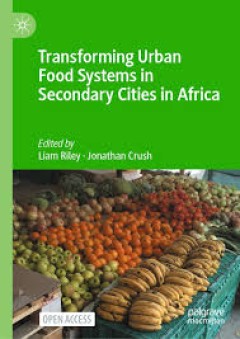
Transforming Urban Food Systems in Secondary Cities in Africa
This book is a product of the Food, Urbanization, Environment and Livelihoods (FUEL) Project of the African Food Security Urban Network (AFSUN) funded by an Insight Grant from the Social Sciences and Research Council of Canada (SSHRC). The publication of the book was made possible by a Connection Grant from SSHRC, which also funded a virtual workshop attended by the authors on May 13 and 1…
- Edition
- -
- ISBN/ISSN
- 9783030930721
- Collation
- XIX, 402
- Series Title
- -
- Call Number
- -
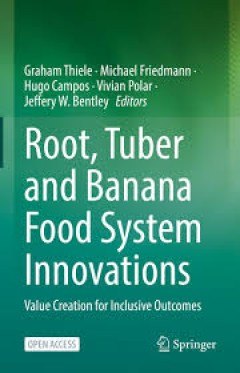
Root, Tuber and Banana Food System Innovations
Root, tuber, and banana (RT&B) crops play a critical role in food and nutrition security in developing countries, increasingly so in sub-Saharan Africa (SSA). They have great potential to contribute to alleviate poverty, improve health and nutrition, and enhance the resilience of smallholder farmers to climate change. However, RT&Bs are characterized by unique challenges including veget…
- Edition
- -
- ISBN/ISSN
- 9783030920227
- Collation
- XXXV, 561
- Series Title
- -
- Call Number
- -

Beyond Global Food Supply Chains
This open access book takes the upheaval of the global COVID-19 pandemic as a springboard from which to interrogate a larger set of structural, environmental and political fault lines running through the global food system. In a context in which disruptions to the production, distribution, and consumption of food are figured as exceptions to the smooth, just-in-time efficiencies of global suppl…
- Edition
- -
- ISBN/ISSN
- 978-981-19-3155-0
- Collation
- -
- Series Title
- -
- Call Number
- -
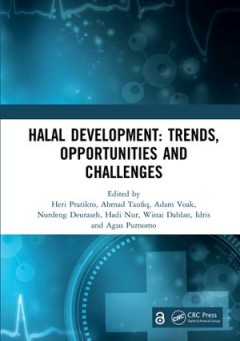
Halal Development : Trends, Opportunities and Challenges
The increasing demand for halal products, including goods and services, every year, especially for food and beverages, has resulted in a growing need for products with halal guarantees. Along with the increasing trend of the global demand, it has resulted in an increase in producers of halal food and beverages in both Muslim and non-Muslim countries. In addition the demand for halal tourism is …
- Edition
- -
- ISBN/ISSN
- 978-1-003-18928-2
- Collation
- -
- Series Title
- -
- Call Number
- 641.3 HAL
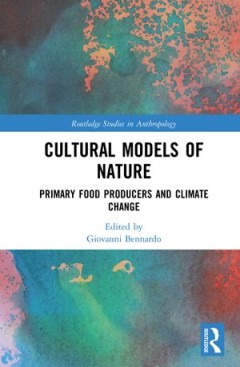
Cultural Models of Nature : Primary Food Producers and Climate Change
Drawing on the ethnographic experience of the contributors, this volume explores the Cultural Models of Nature found in a range of food-producing communities located in climate-change affected areas. These Cultural Models represent specific organizations of the etic categories underlying the concept of Nature (i.e. plants, animals, the physical environment, the weather, humans, and the supernat…
- Edition
- -
- ISBN/ISSN
- 9781351127905
- Collation
- -
- Series Title
- -
- Call Number
- -

Technological Innovations in Tropical Livestock Development for Environmental…
This book contains the proceedings of the fourth International Conference on Tropical Animal Production for Food Security (ITAPS) exploring Technological Innovations in Tropical Livestock Development for Environmental Sustainability and Food Security. It discusses two interconnected issues: tropical livestock farming and environmental concerns, while addressing the adoption of innovative techn…
- Edition
- -
- ISBN/ISSN
- 9781003468943
- Collation
- -
- Series Title
- -
- Call Number
- -

Science and Innovations for Food Systems Transformation
This Open Access book compiles the findings of the Scientific Group of the United Nations Food Systems Summit 2021 and its research partners. The Scientific Group was an independent group of 28 food systems scientists from all over the world with a mandate from the Deputy Secretary-General of the United Nations. The chapters provide science- and research-based, state-of-the-art, solution-ori…
- Edition
- 1
- ISBN/ISSN
- -
- Collation
- -
- Series Title
- -
- Call Number
- XXII, 948
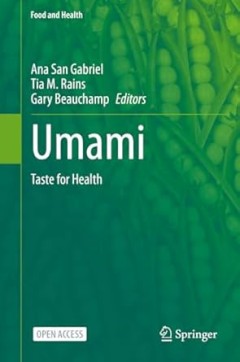
Umami
This Open Access book covers the concept of umami, the unique taste imparted by the amino acid glutamate, was first described in 1908 by Dr. Kikunae Ikeda of Tokyo University. Over the past century, hundreds of studies have explored the mechanistic underpinnings of the taste, leading to the characterization of the umami taste receptor in 2002. How this fifth basic taste figures into nutrition a…
- Edition
- -
- ISBN/ISSN
- 978-3-031-32691-2
- Collation
- XIII, 198
- Series Title
- -
- Call Number
- -
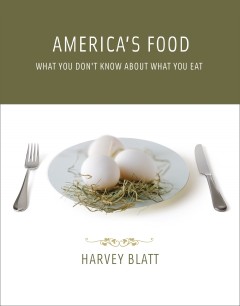
America's Food: What You Don't Know About What You Eat
We don't think much about how food gets to our tables, or what had to happen to fill our supermarket's produce section with perfectly round red tomatoes and its meat counter with slabs of beautifully marbled steak. We don't realize that the meat in one fast-food hamburger may come from many different cattle raised in several different countries. In fact, most of us have a fairly abstract unders…
- Edition
- -
- ISBN/ISSN
- 9780262268653
- Collation
- 1 online resource (ix, 336 pages) :illustrations, map
- Series Title
- -
- Call Number
- -

Food routes:growing bananas in Iceland and other tales from the logistics of …
Finding opportunities for innovation on the path between farmer and table. Even if we think we know a lot about good and healthy food--even if we buy organic, believe in slow food, and read Eater --we probably don't know much about how food gets to the table. What happens between the farm and the kitchen Why are all avocados from Mexico Why does a restaurant in Maine order lamb from New Zealand…
- Edition
- -
- ISBN/ISSN
- 9780262352185
- Collation
- 1 online resource (x, 195 pages).
- Series Title
- -
- Call Number
- -
 Computer Science, Information & General Works
Computer Science, Information & General Works  Philosophy & Psychology
Philosophy & Psychology  Religion
Religion  Social Sciences
Social Sciences  Language
Language  Pure Science
Pure Science  Applied Sciences
Applied Sciences  Art & Recreation
Art & Recreation  Literature
Literature  History & Geography
History & Geography